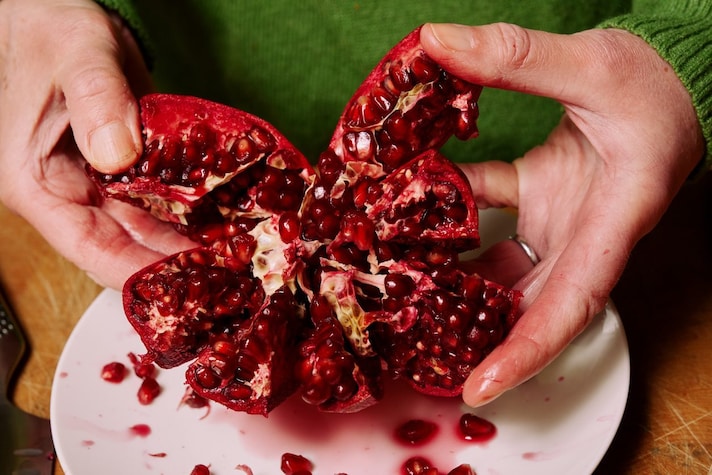Pomegranate: Ancient Superfruit – Health Advantages and Culinary Applications
Revered for centuries, pomegranates are more than just a beautiful fruit—they're packed with antioxidants, vitamins, and fiber, offering impressive health benefits. From supporting heart health to aiding digestion, they’ve been a staple in traditional medicine. Their versatility shines in both sweet and savory dishes, making them a must-have ingredient for those seeking flavor and nutrition.
;Resize,width=742;)
The pomegranate has been revered for thousands of years, featuring in ancient mythology, religious texts, and traditional medicine. From Greek legends to Middle Eastern cuisine, this ruby-red fruit has long symbolized fertility, health, and prosperity. But beyond its cultural significance, the pomegranate stands out as a nutrient powerhouse with impressive health benefits and versatile culinary uses.
Health Benefits of Pomegranates
Pomegranates are packed with antioxidants, vitamins, and fiber, making them one of the healthiest fruits available. Here’s what makes them so special:
1. High in Antioxidants
Pomegranates contain punicalagins and anthocyanins, which help fight free radicals and reduce oxidative stress. Their polyphenol content is even higher than green tea and red wine.
2. Supports Heart Health
Studies suggest that pomegranate juice can lower blood pressure and reduce the risk of heart disease. The fruit’s compounds help reduce cholesterol levels and improve blood flow.

3. Boosts Immunity
Packed with vitamin C and anti-inflammatory properties, pomegranates help strengthen the immune system. They also have antibacterial and antiviral properties that support gut and oral health.
4. Aids Digestion
The fiber content in pomegranates supports gut health and can aid in digestion and weight management. Pomegranate extract is sometimes used in traditional medicine to relieve digestive issues.
5. Potential Anti-Cancer Properties
Some research indicates that pomegranate compounds may slow the growth of cancer cells, particularly in breast and prostate cancer. The high levels of antioxidants contribute to overall cell protection and longevity.
Culinary Applications: How to Enjoy Pomegranates
Pomegranates are incredibly versatile and can be used in a variety of sweet and savory dishes. Here are some of the best ways to incorporate them into your meals:
1. Fresh Pomegranate Arils
Sprinkle them over salads, yogurt, or oatmeal for a burst of flavor and nutrition. Use them as a topping for desserts or smoothie bowls.

2. Pomegranate Juice and Syrup
Enjoy freshly squeezed juice on its own or mixed into smoothies.
Reduce the juice to make pomegranate molasses, a staple in Middle Eastern cooking used for marinades and dressings.
3. Savory Dishes and Salads
Add pomegranate seeds to grain bowls, roasted vegetables, or meat dishes for a sweet-tart contrast. Use the juice as a marinade for chicken, lamb, or fish.
4. Pomegranate in Desserts
Mix arils into cakes, tarts, and puddings for a natural sweetness.
Make pomegranate sorbet for a refreshing treat.
5. Beverages and Cocktails
Use pomegranate juice as a base for mocktails, cocktails, or infused water. Try a pomegranate sangria or margarita for a fruity twist.
How to Select and Store Pomegranates
Look for heavy pomegranates with firm skin—they tend to be juicier.
Store whole pomegranates in a cool, dry place for up to a month or refrigerate for longer shelf life.

Freeze pomegranate seeds in an airtight container for easy access year-round.
Final Thoughts: More Than Just a Beautiful Fruit
Pomegranates offer more than just aesthetic appeal—they are a nutritional powerhouse with centuries of history and countless culinary applications. Whether you enjoy them fresh, in juices, or as a cooking ingredient, their health benefits and versatility make them a superfruit worth celebrating.
;Resize,width=767;)
;Resize,width=712;)


